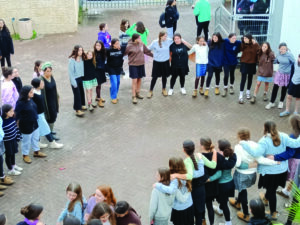Teams from three AMIT schools were over the moon when they recently found out their projects made it to the finals of the Ramon Foundation’s SpaceLab program, which gives students the opportunity to submit a scientific experiment to the International Space Station and have real-life astronauts test it out in space.
The SpaceLab program teaches students about Ilan Ramon, z”l, Israel’s first astronaut who died tragically in the 2003 Space Shuttle Columbia mission, and his son Assaf, z”l, a pilot who died at age 21 when his F-16 fighter jet crashed during a training exercise. Through project-based learning, the students perform several tasks that equip them with the knowledge and skills needed to submit their experiments to the International Space Station.
The three AMIT teams headed to the finals are from AMIT Eitan Junior and Senior High School from Ma’ale Adumim, AMIT Yud Ashdod Junior and Senior High School, and AMIT Gwen Straus Jr. and Sr. Science High School for Boys in Ra’anana. Each of the teams impressed a panel of judges and beat out three other groups from their schools to contend at the final competition, which will take place during Israel Space Week 2020.
AMIT Eitan’s experiment deals with how subgravity affects CBD’s impact on the immune system (CBD or cannabidiol is one of the active ingredients in cannabis and has anti-inflammatory and pain-relieving properties). AMIT Yud Ashdod’s experiment studies gravity’s effect on a protein that may help treat melanoma. Gwen Straus students chose to explore whether plastic-eating bacteria function in space and could be used to help solve the world’s plastic solution problem and even be used as an energy source.
Other students’ experiments had to do with equally weighty topics such as studying the behavior of free radicals in space to help treat the neurodegenerative disease ALS; iron erosion in space; and studying condensation in space using cloud seeding tools.
AMIT schools put an emphasize on STEM curriculum, focusing on science, technology, engineering and mathematics as a way to equip students for 21st-century professions in these fields. They also give students on the geographic and socioeconomic periphery the opportunity to be exposed to such learning, which may lead them into careers in these fields, including space science.
“The future generations are in good hands,” said AMIT Yud Ashdod Principal Moti Arbel. “It’s amazing to watch the students research and study their chosen topics with a spark in their eyes. I believe they will reach the front lines of scientific research in the country, the world and in space.”





